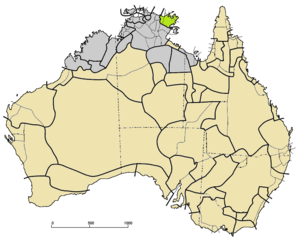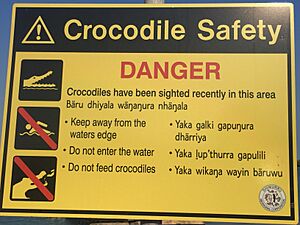Yolŋu languages facts for kids
Quick facts for kids Yolŋu Matha |
|
|---|---|
| Yuulngu | |
| Ethnicity: | Yolngu |
| Geographic distribution: |
In northeastern Arnhem Land, including Elcho Island, Crocodile Islands, Wessel Islands, English Company’s Islands, Northern Territory, Australia |
| Linguistic classification: | Pama–Nyungan
|
| Subdivisions: |
Signed form:
Yolŋu Sign Language —
|
 Yolŋu languages (green) among other Pama–Nyungan (tan)
|
|
Yolŋu Matha (pronounced 'yoong-oo maa-taa') means 'Yolŋu tongue'. It is a group of languages spoken by the Yolngu people, who are First Nations people from northeast Arnhem Land in northern Australia. The 'ŋ' in Yolŋu sounds like the 'ng' in the word singing.
Contents
Different Yolŋu Matha Languages
Yolŋu Matha is made up of about six main languages. Some of these languages are quite similar, so speakers can understand each other easily. There are also around thirty different clan varieties and about twelve different dialects, each with its own Yolŋu name.
About 4,600 people speak Yolŋu Matha languages. Traditionally, mothers and fathers often spoke different languages. This meant that children usually grew up speaking at least two languages, and sometimes even more! This helped everyone communicate easily across different groups.
Here are some of the main Yolŋu Matha languages and their varieties:
| Dhangu-Djangu language | Nhangu language | Dhuwal language | Ritharngu language | Djinang language | Djinba language |
|---|---|---|---|---|---|
| Wan.gurri | Gamalaŋga | Gupapuyngu | Ritharngu | Yirritjing | Ganhalpuyngu (Ganalbiŋu) |
| Lamamirri | Gorryindi | Gumatj | Wagilak | Wurlaki | Manjdjalpuyngu (Mandjalpiŋu) |
| Rirratjingu | Mäḻarra | Djambarrpuyngu | Djardiwitjibi | ||
| Gaalpu | Bindarra | Djapu | Mildjingi | ||
| Ngayimil | Ngurruwulu | Liyagalawumirr | Balmbi | ||
| Warramiri | Walamangu | Guyamirlili | Djuwing | ||
| Mandatja | Dhalwangu | Marrangu | |||
| Djarrwark | Murrungun | ||||
| Manyarring |
Sounds of Yolŋu Matha
The sounds in Yolŋu Matha languages are mostly similar. They have a range of consonant and vowel sounds.
Consonant Sounds
Here are the main consonant sounds found in Yolŋu Matha:
| Outer Mouth | Tongue Tip | Tongue Blade | Throat | ||||
|---|---|---|---|---|---|---|---|
| Lips | Back of Mouth | Alveolar | Dental | Retroflex | Palatal | Glottal | |
| Soft Sounds | b b | ɡ g | d d | d̪ dh | ɖ d̠ | ɟ dj | ʔ ' |
| Strong Sounds | p p | k k | t t | t̪ th | ʈ t̠ | c tj | |
| Nose Sounds | m m | ŋ ŋ | n n | n̪ nh | ɳ n̠ | ɲ ny | |
| 'R' Sounds | r rr | ɻ r | |||||
| Side Sounds | l l | ɭ l̠ | |||||
| Glide Sounds | w w | j y | |||||
Vowel Sounds
Yolŋu Matha languages generally have three main vowel sounds. Some varieties also have long and short versions of these vowels. Long vowels only appear at the beginning of words.
| Front | Middle | Back | |
|---|---|---|---|
| Close | i i, iː e | u u, uː o | |
| Open | a a, aː ä |
Yolŋu Matha in Movies and Music
Yolŋu Matha has been featured in popular culture, helping more people learn about these languages.
The movies Ten Canoes (2006) and Charlie's Country (2013) both used Yolŋu Matha dialogue. These films were directed by Rolf de Heer and starred actor David Gulpilil. Ten Canoes was special because it was the first full-length movie filmed entirely in Australian Indigenous languages. Most of its dialogue was in the Ganalbiŋu variety of Yolŋu Matha.
Dr. G. Yunupingu was a famous Australian singer who sang in the Gumatj dialect of Yolŋu Matha. The Aboriginal rock band Yothu Yindi also sang in Yolŋu Matha.
In 2017, Baker Boy released his song "Cloud 9," where he raps in Yolŋu Matha. He is from the community of Milingimbi in North Eastern Arnhem Land. As Young Australian of the Year in 2019 (which was also the International Year of Indigenous Languages), Baker Boy helped bring Yolŋu Matha to a wider audience. His music made people proud of their language.
Learning Resources for Yolŋu Matha
There are several resources available for learning Yolŋu Matha.
Dictionaries have been created by people like Beulah Lowe and David Zorc. In 2015, Charles Darwin University launched a free online dictionary created by John Greatorex.
You can also find grammar books about Yolŋu languages by Jeffrey Heath, Frances Morphy, and Melanie Wilkinson.
Charles Darwin University offers a special course called a graduate certificate in Yolŋu studies. In this course, you can learn about Yolŋu family systems, laws, and the Gupapuyŋu language.
The ABC has an Indigenous News Radio program that broadcasts news in Yolŋu Matha and Warlpiri on weekdays. The Aboriginal Resource and Development Services (ARDS) also broadcasts live radio in northeast Arnhem Land, Darwin, and Palmerston. They also have recordings of past programs online.
Common Yolŋu Matha Words and Phrases
Here are some words and expressions from Yolŋu Matha:
- Gakal – 'skill, talent, ability'
- Bäru – 'crocodile'
- Gapumirr – 'with water' (like a bucket with water), or 'watery'.
- Manymak – 'good, OK'
- Yol or Yo (pronounced 'yo') – 'yes'
- Yo manymak – When used together, this phrase can mean 'good' or 'OK'. It's also used as a friendly greeting. The 'o' in yo is often held longer when used this way.
- Yaka – 'no'
- Yothu – 'child'
- Akka – 'sister'
- Yindi – 'big'
- Yothu Yindi – This phrase describes a special connection between two different things, like a mother-child relationship.
Words from Other Languages
Like other languages in northern Australia, Yolŋu Matha has many words that came from Austronesian languages. This happened because the Yolŋu people had a lot of contact with sailors from the Indonesian archipelago. Experts have found many Yolŋu Matha words that clearly came from Austronesian languages.
Here are some examples of words borrowed from Austronesian languages:
| Yolngu word | Original Language | Original Word | Meaning in English |
|---|---|---|---|
| balaʔ | Makassarese | bállaʔ | house |
| balala | Makassarese | balála | greedy |
| balaŋu | Makassarese | balaŋo | anchor |
| baluka | Makassarese | palúkka | thief |
| baːwʔ | Makassarese or Buginese | báuʔ | fragrance |
| gaːruŋ | Malay | karoŋ | sack |
| barawu | Malay | perahu | boat |
Basic Words in Different Yolŋu Matha Languages
Here is a table showing some basic words in different Yolŋu Matha languages. You can see how the words for the same thing can be different across the various dialects.
| gloss | Wan‘guri | Warameri | Galbu | Riraidjango | Yanango | Golba | Gobabwingo | Djambarbwingo | Dalwongo | Ridarngo | Gomaidj | Manggalili | Maṙaṙba | Djinba | Yandjinang |
|---|---|---|---|---|---|---|---|---|---|---|---|---|---|---|---|
| man | jọlŋọ | jọlŋọ | jọlŋọ | jọlŋọ | jọlŋọ | jọlŋọ | jọlŋọ | jọlŋọ | jọlŋọ | jọlŋọ | jọlŋọ | jọlŋọ | jọlŋọ | julŋi | djäriwidji |
| woman | baɖami | baɖami | miälg | da‘iga | miälg | miälg | miälg | miälg | mareːbulu | diŋ‘ | daigaːwuru | daigaːwuru | miälg | miälg | miːlg |
| head | muɽguɽ | muɽguɽu | mulguɽ | mulguɽ | daːmbu | daːmbu | lia | lia | mulguɽ | lia | lia | lia | mulguɽ | gungu | gɔɳgi |
| eye | maŋudji | maŋudji | miːl, maŋudji | miːl | maŋudji | miːl | miːl | miːl | maŋudji | miːl | miːl | miːl | miːl | mili | mïːl |
| nose | ŋọrọ | gamuru | ŋọrọ | ŋọrọ | gamuru | ŋọrọ | ŋọrọ | ŋọrọ | ŋọrọ | ŋọrọ | ŋọrọ | ŋọrọ | ŋɔrɛ | ŋɔrɛ | |
| mouth | ḏa | djurwara | ḏa | ḏa | durwara | ḏa | ḏa | ḏa | ḏɛlŋ | ḏa | ḏa | ḏa | ɽari | ɽari | |
| tongue | ŋaːnar | maḏa | maḏa | ŋaːnar | ŋaːnar | mada | maḏa | maḏa | ŋaːnar | maḏa | ŋaːnar | ŋaːnar | maḏa | djäliŋan | djɛlaŋ |
| stomach | guru | gulun | gulun | dulmọ | gulun | gulun | gulun | gulun | dulmọ | gulun | gulun | gulun | gulun | gulun | budjiri |
| bone | maṙiṙin | ŋaɽaga | ŋaɽaga | ŋaɽaga | maṙiṙin | ŋaɽaga | ŋaɽag | ŋaɽaga | ŋaɽaga | ŋaɽaga | ŋaɽaga | ŋaɽaga | ŋaɽaga | ŋiɽigɛ | |
| blood | gulaŋ | jilaŋ | gulaŋ | gulaŋ | gulaŋ | gulaŋ | maŋgo, gulaŋ | maŋgo, gulaŋ | gulaŋ | gula | gulaŋ | wuɽuŋgul | gulaŋ | gulaŋ | bɔṙɛ |
| kangaroo | wiːɖi | wiːɖi | mundbia | mulbia | wiːɖi | wiːɖi | wiːɖi | ganguɽul | ŋarggọ | mulbia | mulbia | mulbia | ŋarggọ | ŋargọ | |
| possum | ɽubu | marŋo | marŋo | marŋo | marŋo | marŋo | marŋo | marŋo | ɽubu | marŋo | marŋo | ɽubu | marŋo | märŋo | marŋo |
| emu | maluiːja | wurban | ’maluja | maluiːja | baɖaːwuma | wurban | wurban | wurban | wurban | wurban | wurban | wurban | |||
| crow | galgmanda | waːg | gälgäriŋọ | waːg | galgmanda | waːg | waːg | waːg | waːgia | waːg | waːg | waːg | waːgia | waːgire | |
| fly | buad | gädiŋälọ | wurubul | buad | buad | wurulul | wurulul | gädiŋäli | buad | gädiŋälọ | gädiŋäli | wurulul | bolgi | muruläl | |
| sun | walọ | walọ | walọ | walọ | bïːn | walọ | walọ | walọ | larŋgai | walir | walọ | walọ | walọ | djäɽbiɽ | walir |
| moon | wa̱lmura | boːla | ŋaɭindi | wa̱lmura | walmura | wa̱lmura | ŋaɭindi | ŋaɭindi | ŋaɭindi | ŋaɭindi, gulgia | ŋaɭindi | wirmu | naɭindi | galgi | ɽangu |
| fire | ŋurdja | ŋurdja | ḏäŋuḏa | ḏäŋuḏa | bwiːmar | guɽda̱ | guɽḏa | guɽḏa | ḏäŋuḏa | guɽḏa | goɽḏa | ’bujuga | ŋuɽa | djoŋgɛ | djoŋgɛ |
| smoke | ŋawurŋawur | ḏiliwur | ŋäräli | ŋäräli | ḏiliwur | ḏiliwur | ḏiliwur | ŋäräli | baːn | ḏiliwur | diliwur | ŋäräli | mälggɛ | ŋaɽimbi | |
| water | ŋargula | gaɽmag | magadi | gabu | gabu | gabu | gabu | gabu | gudjärg | gabu | gabu | gudjäɽg | gabu | gabi | gabe |
 | Mary Eliza Mahoney |
 | Susie King Taylor |
 | Ida Gray |
 | Eliza Ann Grier |


